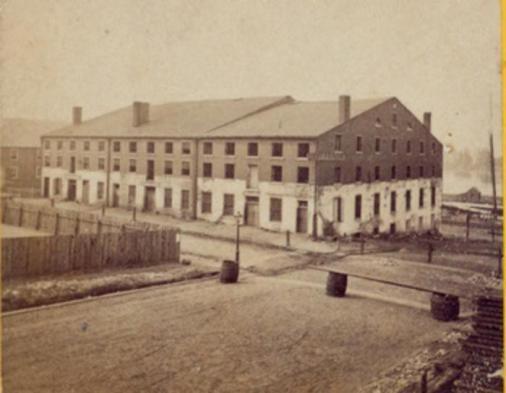Confederate Army takes civilian prisoners after the Battle of Gettysburg
Editor’s Note: This is the first in a series of three posts about the civilians who were taken as prisoners of war by the Confederate Army after the Battle of Gettysburg in 1863.

Libby Prison in Richmond, Va., where the Gettysburg civilian prisoners were kept for a time.
In March of 1865, the country was still at war, but the end was near. The Confederacy was collapsing and the Union was pressing its advantage and forcing the Confederate Army to retreat.
They would not surrender easily, though. Just a couple weeks earlier, 40 McNeill’s Rangers had snuck into Union-occupied Cumberland, Md., and kidnapped General George Crook and General Benjamin Kelley from their hotel rooms. They escaped back into Virginia and delivered the prisoners to the infamous Libby Prison where they were promptly ransomed back to the Union.
The generals’ incarceration hadn’t even lasted a month. They were lucky.
Around the same time negotiations were underway to free the generals, several men returned home to Adams County, Pennsylvania. They had been missing for 20 months. They weren’t victorious soldiers. They were farmers, postmasters, and ordinary citizens. They were also a secret, or perhaps, a shame of the Confederacy because these men were civilians arrested by the Confederate Army at the end of the Battle of Gettysburg and marched back to Virginia when the Confederate Army retreated.
“The hostages were selected from three target groups. They were agents of the government such as postmasters or tax collectors, they defied or criticized the invaders or they were prominent citizens in the community,” James Cole, a descendant of one of the hostages, said in a 1994 interview.
On July 2, 1863, Confederate soldiers arrested Samuel Pitzer and his uncle, George Patterson on the suspicion that they were spies. The rebel sharpshooters were hidden behind the Pitzer Schoolhouse and surprised Pitzer and Patterson.
The two men argued that they were farmers not spies. The soldiers told them that they would have to go to the headquarters for a hearing.
“As they did not find any firearms upon us they assured us that we would not be held after the hearing. When we reached headquarters however Major Fairfax said it was too late to give the hearing that night and put if off till morning,” Pitzer wrote of his experiences years later and reported in the History of the St. James Lutheran Church.
The following day, the Confederates were defeated and started their retreat. All thought of the hearing was forgotten and the prisoners were forced to march south, accompanied by a guard who stood beside each prisoner.
Emanuel Trostle, was another Gettysburg farmer. He lived with his wife and child on Emmittsburg Road. During the battle, a Confederate colonel rode up to his farmhouse and warned him that his family was in danger because of the battle.
“Mr. Trostle, who was crippled at the time, and walked with the aid of a staff and crutch, told the colonel that he could not pass through his pickets. The colonel told him that he would take him through, and accordingly did so,” the Gettysburg Times reported in 1914 when Trostle died.
Trostle had second thoughts the next morning, though. He worried about some of the household goods that he had left behind and headed back, accompanied by a friend. They got as far as the pickets before they were captured.
“He was taken to the battle-field, expecting to be paroled, but the firing opened before the parole could be made out. He was taken to Staunton, Va., walking the entire distance of 175 miles; was on the road six days, and for three days had not a mouthful to eat,” according to the Gettysburg Times.
When the Confederates left Pennsylvania at the end of the Battle of Gettysburg, they left with eight civilians: George Codori, J. Crawford Guinn, Alexander Harper, William Harper, Samuel Pitzer, George Patterson, George Arendt, and Emanuel Trostle.





